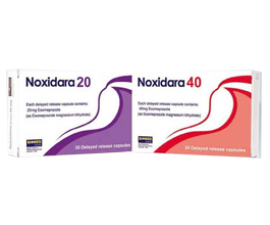Noxidara
- Esomeprazole
NOXIDARA
(Delayed release Capsules)
Composition:
Each NOXIDARA Delayed release capsule contains:
20, 40 mg Esomeprazole (as esomeprazole magnesium trihydrate).
CLINICAL PHARMACOLOGY :
Mechanism of Action :
Esomeprazole suppresses gastric acid secretion by specific inhibition of the H + /K + -ATPase in the gastric parietal cell. The S- and R-isomers of omeprazole are protonated and converted in the acidic compartment of the parietal cell forming the active inhibitor, the achiral sulphenamide. By acting specifically on the proton pump, esomeprazole blocks the final step in acid production, thus reducing gastric acidity. This effect is dose-related up to a daily dose of 20 to 40 mg.
Absorption
The C max of esomeprazole increases proportionally when the dose is increased, and there is a three-fold increase in the (AUC) from 20 to 40 mg. At repeated once-daily dosing with 40 mg, the systemic bioavailability is approximately 90% compared to 64% after a single dose. The AUC after administration of a single 40 mg dose of esomeprazole is decreased by 43-53% after food intake compared to fasting conditions.
Distribution
Esomeprazole is 97% bound to plasma proteins. Plasma protein binding is constant over the concentration range of 2-20 µmol/L. The apparent volume of distribution at steady state is approximately 16 L.
Metabolism
Esomeprazole is extensively metabolized in the liver by the cytochrome P450 enzyme system. The major part of esomeprazole's metabolism is dependent upon the CYP2C19 isoenzyme, the remaining amount is dependent on CYP3A4. Following administration of equimolar doses, the S- and R-isomers are metabolized differently by the liver, resulting in higher plasma levels of the S- than of the R-isomer.
Excretion
The plasma elimination half-life of esomeprazole is approximately 1-1.5 hours. Less than 1% of parent drug is excreted in the urine. Approximately 80% of an oral dose of esomeprazole is excreted as inactive metabolites in the urine, and the remainder is found as inactive metabolites in the feces.
INDICATIONS AND USAGE
NOXIDARA is indicated in:
1. Treatment of Gastroesophageal Reflux Disease (GERD):
- Short-term treatment (4 to 8 weeks) in the healing and symptomatic resolution of erosive esophagitis. If symptoms do not resolve completely after 4-8 weeks of treatment, an additional 4-8-week course of NOXIDARA may be considered.
- Maintenance of healing of erosive esophagitis (maintain symptom resolution).
- Symptomatic Gastroesophageal Reflux Disease (treatment of heartburn and other associated symptoms).
2. Reduction in the occurrence of gastric ulcer associated with continuous NSAID therapy in patients at risk for developing gastric ulcers. Patients are considered at risk due to their age (≥60) and/or documented history of gastric ulcers.
3. H. pylori Eradication to reduce the risk of duodenal ulcer recurrence (Triple Therapy) NOXIDARA, in combination with amoxicillin and clarithromycin, is indicated for the treatment of patients with H. pylori infection and duodenal ulcer disease (active or history of within the past 5 years). Eradication of H. pylori has been shown to reduce the risk of duodenal ulcer recurrence.
4. Long-term treatment of pathological hypersecretory conditions, including Zollinger-Ellison syndrome.
5. Short-term treatment of Gastroesophageal Reflux Disease (GERD) in pediatrics (12 to 17 Years Old).
CONTRAINDICATIONS
NOXIDARA is contraindicated in patients with known hypersensitivity to any component of the formulation or to substituted benzimidazoles.
PRECAUTIONS AND WARNINGS
- Symptomatic response to therapy with NOXIDARA does not preclude the presence of gastric malignancy.
- In long-term treatment, Atrophic gastritis has been noted occasionally.
Drug Interactions
- Esomeprazole inhibits gastric acid secretion. Therefore, esomeprazole may interfere with the absorption of drugs where gastric pH is an important determinant of bioavailability (eg, ketoconazole, iron salts and digoxin).
- Concomitant use of atazanavir and Proton pump inhibitors is not recommended.
- Esomeprazole may potentially interfere with CYP2C19. Coadministration of esomeprazole and diazepam (a CYP2C19 substrate) resulted in a decrease in clearance of diazepam. Caution must be considered when esomeprazole is used concomitantly with these drugs, and dose reduction may be necessary for these drugs.
- Patients treated with proton pump inhibitors and warfarin concomitantly may need to be monitored for increases in INR and prothrombin time.
- Combination Therapy: Co-administration of esomeprazole, clarithromycin, and amoxicillin has resulted in increases in the plasma levels of esomeprazole and 14-hydroxyclarithromycin.
Pregnancy and Nursing Mothers (Pregnancy Category B)
There are no adequate studies of esomeprazole in pregnant women. This drug should be used during pregnancy only if clearly needed. The excretion of esomeprazole in human milk has not been studied, a decision should be made whether to discontinue nursing or to discontinue the drug, taking into account the importance of the drug to the mother.
ADVERSE REACTIONS
Common: Headache, diarrhea, nausea, flatulence, abdominal pain, constipation, and dry mouth.
Rare: Pruritus, rash, insomnia, malaise, myalgia, somnolence, visual disturbance, and anaphylactic reaction.
OVERDOSAGE AND MANAGEMENT
There have been some reports of overdosage with esomeprazole. Single doses of 80 mg of esomeprazole were uneventful. No specific antidote for esomeprazole is known. Since esomeprazole is extensively protein bound, it is not expected to be removed by dialysis. In the event of overdosage, treatment should be symptomatic and supportive.
Dosage adjustment in patents with severe Hepatic insufficiency: In patients with severe hepatic insufficiency a dose of 20 mg once daily should not be exceeded.
DOSAGE AND ADMINISTRATION
NOXIDARA capsule should be swallowed whole without chewing and taken at least one hour before eating. The recommended dosages are outlined in the table below:
|
||||||||||||||||||||||||||||||||||||||||||||||||||||||
Presentation:
NOXIDARA 20 mg: Box contains 30 Delayed release Capsules.
NOXIDARA 40 mg: Box contains 30 Delayed release Capsules.

